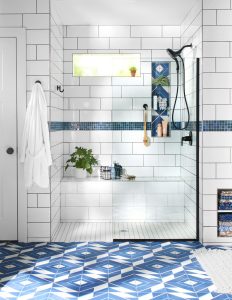Tiles Are Best suited for Bathroom Floors
The tiles you choose for your bathroom floor are one of the most important design elements in your home and offer a unique opportunity to add texture, pattern and colour. Whether you’re going for a sleek, contemporary look or a cozy, rustic vibe, the right tile can be a big part of your bathroom’s overall feel.
There are a variety of options to consider, from ceramic and porcelain, to natural stone, cement and pebbles. Some types are more comfortable to walk on barefoot than others, but all of them can add a sense of luxury to your space. Porcelain is a popular choice for bathrooms, as it’s extremely durable and comes in a huge range of colours and styles. It’s also non-porous which means it can handle moisture without absorbing it and is easier to clean. But because it’s a denser material than ceramic, it can be more expensive to install.

Ceramic tiles in bathroom are available in a wide variety of colours, designs and sizes and are very affordable. They’re very easy to clean and are resistant to scratches. However, they can be cold on bare feet and are not as hard-wearing as porcelain or natural stone.
Which Types of Tiles Are Best suited for Bathroom Floors?
Marble is an exquisitely beautiful option, and it’s also very durable. It can be patterned or veined and offers an elegant, timeless aesthetic. However, it’s not the most practical choice for a busy family bathroom as it can be slippery and is sensitive to heat. Granite is another hard-wearing and stylish option for a bathroom. It can be sandblasted to create a smooth surface and is available in a range of colours. Granite is also a great choice for showers as it’s naturally slip-resistant and is easy to maintain.
Cement tiles, known as encaustic cement tiles, are handmade and come in both bold colours and traditional motifs to suit any style. They’re also hard-wearing and highly moisture-resistant, but they require regular sealing to prevent stains. Mosaic tiles are small in size and can be made from a wide range of materials, including glass, stone and ceramic. They’re great for adding texture and visual interest to a bathroom and the grout lines make them slip-resistant.
There are also a number of other less traditional tile options that can be used for flooring, such as cork and linoleum. However, they’re not suitable for very wet areas and can be prone to mould and mildew growth. Alternatively, vinyl plank (LVP) is a great option for floors as it mimics the look of natural materials like hardwood and stone but is more water-resistant and easy to clean. It’s also softer underfoot than many other types of flooring, making it more comfortable to walk on barefoot.